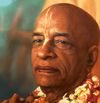Jaṭila Samasyā – "Critical Crisis"
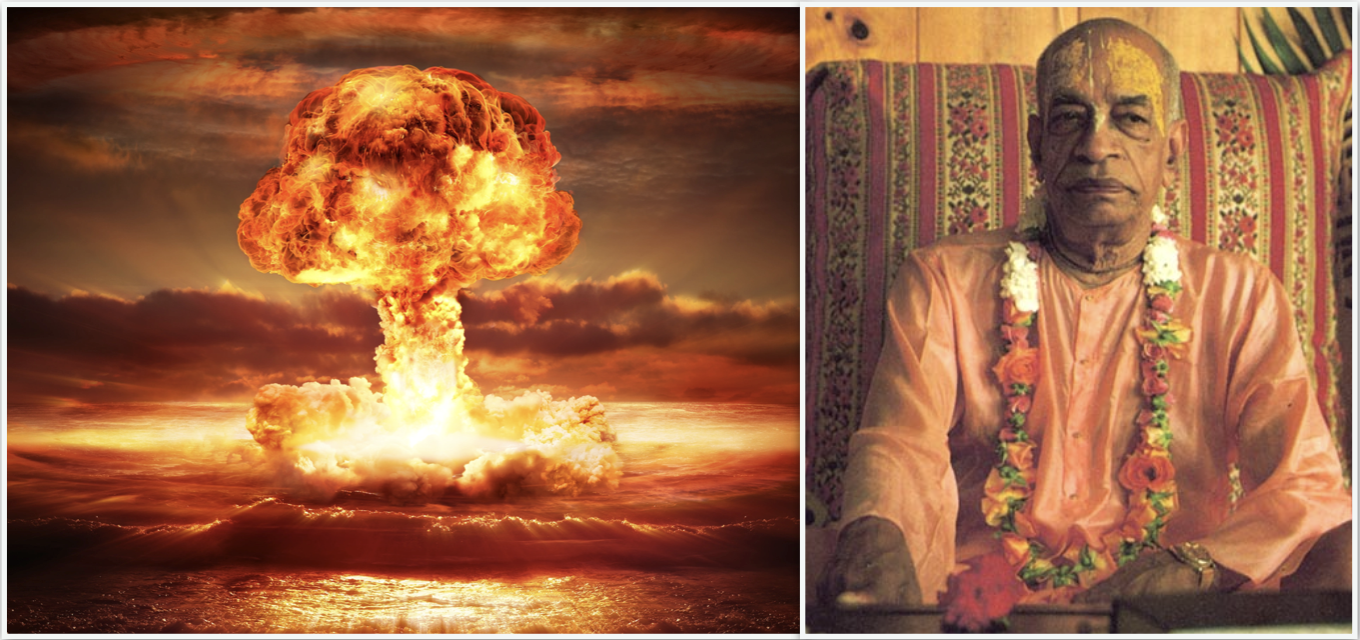
yasyātma-buddhiḥ kuṇape tri-dhātuke, sva-dhīḥ kalatrādiṣu bhauma ijya-dhīḥ
yat-tīrtha-buddhiḥ salile na karhicij-janeṣv abhijñeṣu sa eva go-kharaḥ
(Bhāgavatam 10.84.13)
[A person who identifies as what is essentially a corpse composed of three elements (kapha, vāta, and pitta), who feels his spouse and offspring are his true relatives, who ascribes holiness to earthen idols, and thinks the water in rivers and lakes is what constitutes a purifying place of pilgrimage, but does not give such regard to saintly persons who are acquainted with the truth of the Supreme Being—such a man is deemed a cow or donkey, or rather, a donkey that carries grass or feed for cows.]
All individuals who do not listen to those possessed of higher knowledge and who instead strive to invent a path to prosperity for all, are characterized by a tendency to identify with the material body, which is but a bag of bones and meat mixed together with mucus, bile and air. As one identifies with the material body, love arises for that body and everything related to it—one’s spouse and children, their bodies and the home one shares with them, as well as the place those bodies were born. Thus, one develops love for the country of one’s birth. Once such love of country is awakened, peoples’ identification with the body becomes so far extended that a sense of reverence for what is but mere dirt arises. These people who have reverence for dirt eventually separate into factions and in this way, end up engaging in activities that simply widen the path to their assured mutual destruction.

From this identification with the body arises identification with one’s country, and at present we are witnessing refulgent proof of the kind of inconvenience that occurs because of that for the people of the world. Of all such factions on Earth at present, two, the ‘Russian faction’ and ‘American faction’, are extremely overpowered by their reverence for their dirt. For about ten years now, there has been a snāyu-yuddha (“a war of nerves”) or a ‘cold war’ going on in a variety of ways between these two opposing factions of people. In other words, in anticipation of future conflicts, both have busied themselves with presenting nuclear arms before a ‘hot war’, the culmination of explosive ammunitions, can even start. This mutual depletion of might for the sake of inventing these nuclear weapons is being advertised as a war of nerves. Even before these two factions start their hot war, we are grasping something of the fact that the ultimate stage of such obsessive identification with one’s country leads to total ruin.
What is happening now is a rehearsal, or stage-setting, for how they will engage in a hot war. Russia and America are regularly testing the destructive power of their nuclear weapons by detonating them in desolate areas or in the ocean. They have already completed almost sixty-six of these detonations on the planet. Of them, America alone is responsible for around fifty-one. Russia has completed twelve and England three. The harm or inauspiciousness that has been perptrated upon the world by these detonations is particularly significant. We see mention of this sort of harm and evil in Bhagavad-gītā:
asatyam apratiṣṭhaṁ te jagad āhur anīśvaram
aparaspara-sambhūtaṁ kim anyat kāma-haitukam
etāṁ dṛṣṭim avaṣṭabhya naṣṭātmāno ’lpa-buddhayaḥ
prabhavanty ugra-karmāṇaḥ kṣayāya jagato ’hitāḥ
[They say that this world is unreal, with no foundation and no God in control. They say it is produced of sex desire and has no cause other than lust. Following such conclusions, the demoniac, who are lost to themselves and who have no intelligence, engage in unbeneficial, horrible works meant to destroy the world.]

Persons of demoniac persuasion become engrossed in bodily identification and ignore the words of saints, scripture, and spiritual masters. The aggressive acts they engage in are characteristic of a dirt-enthralled smallmindedness, and we are witnessing the evil that has subsequently been inflicted upon the world. A veteran physicist from the University of London, Professor Joseph Rotblat, is cautioning the world as follows: “It is no longer a question of two nations or groups of nations devastating each other, but of all the future generations who will forever pay through disease, malformation and mental disability for our folly.”
This animosity is no longer contained between just two races or societies. The prospect of this bad blood costing future generations of humanity their lives, through disease and misery, is utterly dreadful. Nuclear warfare will certainly result in people across the Earth being burned alive and plagued by countless varieties of illness, but what is more dreadful is that people will become stunted and dwarf-like, and their brains practically incapacitated. If we of the present moment demonstrate the prowess of atomic weapons, it will be our future generations who reap the results.
The detonation of these atomic weapons and the use of the brahmāstra mentioned in our scriptures is nearly the same. In Śrīmad-Bhāgavatam, we find the following account of Aśvatthāmā’s use of this brahmāstra:
“Tataḥ prāduṣkṛtaṁ tejaḥ pracaṇḍaṁ sarvato diśam – Thereupon a fierce glare spread in all directions.” Pursued by Arjuna, Aśvatthāmā was fearing for his life—“astraṁ brahma-śiro mene ātma-trāṇaṁ dvijātmajaḥ – the brāhmaṇa’s son invoked the brahmāstra to save himself.” That son of a brāhmaṇa (but not a true brāhmaṇa), Aśvatthāmā, who had no foresight, thought the brahmāstra was his only means of escape, and so he used it, even though he did not know the mantra to retract it. Consequently, the fiery glare of that brahmāstra spread everywhere and assumed a terrifying form. Just as atomic explosions create an increase of radiation, the use of the brahmāstra increases the heat of the whole Earth. Seeing the sudden panic created by the increase of heat, Arjuna inquired from Śrī Kṛṣṇa:
“kim idaṁ svit kuto veti deva-deva na vedmy aham
sarvato mukham āyāti tejaḥ parama-dāruṇaṁ ”
(Bhāgavatam 1.7.26)
He asked, “O Śrī Kṛṣṇa! How did this intolerable increase of heat occur so suddenly? The glare of this heat has spread everywhere and has assumed a ghastly form. Bhagavān Śrī Kṛṣṇa responded:
vetthedaṁ droṇa-putrasya brāhmam astraṁ pradarśitam
naivāsau veda saṁhāraṁ prāṇa-bādha upasthite
na hy asyānyatamaṁ kiñcid astraṁ pratyavakarśanam
jahy astra-teja unnaddham astra-jño hy astra-tejasā
(Bhāgavatam 1.7.27–28)
“Know that this glaring heat you are experiencing has occurred because the son of Droṇa has cast a brahmāstra. That son of Droṇa has used this weapon without knowing how to retract it. He has committed this atrocity to save his own life. The fact that this bogus brāhmaṇa has committed such a shortsighted act tells us that he lacks actual expertise in the use of the brahmāstra. You, however, are not ignorant and do not lack skill in the use of such weapons. You know how to counteract this astra, so take the proper steps to do so. Overpower this brahmāstra. Eliminate this fiery glare with that of another brahmāstra, one that is more advanced. Once you have destroyed this inferior brahmāstra, you can retract the radiation of your brahmāstra.”

śrutvā bhagavatā proktaṁ phālgunaḥ para-vīra-hā
spṛṣṭvāpas taṁ parikramya brāhmaṁ brāhmāstraṁ sandadhe
saṁhatyānyonyam ubhayos tejasī śara-saṁvṛte
āvṛtya rodasī khaṁ ca vavṛdhāte ’rka-vahnivat
dṛṣṭvāstra-tejas tu tayos trīl lokān pradahan mahat
dahyamānāḥ prajāḥ sarvāḥ sāṁvartakam amaṁsata
(Bhāgavatam 1.7.29–31)
“Hearing Bhagavān’s words, Phālgunī (Arjuna), then performed ācamana, sipping water, before reciting the brahmāstra-mantra. After circumambulating Bhagavān Śrī Kṛṣṇa, he deployed his own brahmāstra with the purpose of counteracting the brahmāstra unleashed by the son of Droṇa. The combined radiation of the two brahmāstras surged together, forming a colossal fire that covered the Earth and the whole sky. The heat generated was like the fire emanating from the mouth of Saṅkarṣaṇa at the time of universal annihilation which causes the sun to become radioactive. The great warrior Arjuna observed the devastation of that radiation and understood that all the three worlds and their inhabitants were being subjected to great distress; therefore, he fully retracted the radiation of those two brahmāstras for the welfare of all, to protect the inhabitants of the worlds who were being burnt by that radiation, as per the wish of Bhagavān Vāsudeva.”
What is inferred from the abovementioned evidence of scripture is that unlike the scientists who are wasting so much money and energy on the creation of modern nuclear weapons, the warriors of ancient India were privy to a more subtle science of using mantra to deploy their brahmāstras. Not only did they know how to deploy such weapons, they also knew how to retract them. Śrī Kṛṣṇa detested Droṇa’s son, a half-educated bogus brāhmaṇa, as well as his use of the astra, but He did not detest the valiant Arjuna’s use of astra, for he did not just deploy a more advanced brahmāstra to counteract Aśvatthāmā’s inferior brahmāstra. When the radiation of both astras began to destroy the Earth, he followed the orders of Bhagavān to protect the living entities who were being burnt alive and extinguished the radiation of both astras. Someone who did not know how to retract a brahmāstra once he deployed it was to never use such a weapon. The great warriors of ancient India were not reckless upstarts. To utilize any such device without proper knowledge is like putting a sharpened, honed blade into the hands of a child. Though modern scientists have invented a mechanism that produces nuclear fission, they have still not developed the capability to ward off or quell its devastating reaction. Consequently, the impending doom heralded by those sixty-six (66) atomic detonations has the masters of such demoniac civilizations worried.
Dr. Cartstarn, a biologist at the University of California, has written the following regarding the dreadful consequences of nuclear weapons: “Since almost every one in the world already has radio-active strontium in bone and teeth, and radio-active iodine in the thyroid gland, their activity might increase through illness and cause generative changes which might be transmitted to posterity.”

America has detonated nuclear explosions in the ocean, killing millions of fish and other aquatic creatures. When these weapons are used on land, just how many millions upon millions of the human race will perish? Everyone has become rather anxious thinking about that, and meanwhile, our independent leaders of India, wishing to join ranks with those world powers, have adopted a so-called policy of non-violence. Our big, big leaders are saying that they will never use destructive nuclear force. We would prefer it if they could follow in the footsteps of the great warrior Arjuna or other exalted personalities of the past and say that they will counteract any nuclear weapons deployed by other countries or curb the nuclear fallout, instead of saying they will not utilize nuclear power. Surely India will maintain its moral standards and acquire the means to curb nuclear fallout if its people can surrender to Śrī Kṛṣṇa like Arjuna did.


The people of India have neglected their ancient leaders and sages, the omniscient Ṛṣis, and through their imitation of the West, they have become “bhauma ijyadhīḥ”, or dirt-worshippers. These “dirt-minded” Indians do not understand that the size of their dirt has been gradually shrinking. There is a huge difference between India today and India 5,000 years ago. India 5,000 years ago comprised of almost the whole of the Earth, whereas India today is but a small portion of land. If the “dirt for brains” inhabitants of India want India’s welfare and want to spread its culture then rather than imitating Western countries, they can investigate how the intelligent classes of those countries are following India, and then they can follow in their footsteps. That is how the inhabitants of India will reap profuse auspiciousness. The progress of mundane science in Western countries and India’s inclination to imitate that cannot be reconciled. The success that Western countries had in mundane science 500 years ago was had by India thousands and thousands of years prior. Even since India gained independence, millions and millions of rupees worth of chemicals, machines, and new medicines are being imported to India. Due to my experience in medicines, I can see that ninety percent of the medicines in any medical store are foreign, and their cost is also extreme. In an age of such progress, however, India is compelled to import from foreign nations because it cannot demonstrate an expertise in those same areas of mundane science. It is not only a matter of medicine. No matter what aspect of mundane society you look at, it seems as if Indians have fallen way behind. Even though big, big ācāryas and scholars crop up every year in our universities, they do not have the ability to compete with the foreign ācāryas. The main reason for this is that the teachings of our ancient Ṛṣis have been neglected, and at present, only Western-style instruction is given everywhere. If we could educate everyone in India’s teachings, the whole Earth would be dependent on India in all matters.
I heard an interesting point from Śrīla Bhakti Pradīpa Tīrtha Mahārāja. When he went to London on behalf of Śrī Gauḍīya Mission to spread the message of Śrī Śrīman Mahāprabhu, Lady Willingdon (Lord Willingdon was the Viceroy of India) asked him what the people of India had come to teach them. And then she said, in an even more arrogant manner: “Your Indians come to our country (to London), we teach them, give them various degrees, and send them back to India, where they live on only a few paisa. So, what is it that the Indians can teach us that you have gone to so much difficulty to come here for?”

Śrīla Tīrtha Mahārāja gave a response to Lady Willingdon’s words by saying, “We have come from India, bringing with us the original teachings of India. We have borne and brought the words of our ancient ācāryas, and if you hear those teachings, you will catch a glimpse of a new light. The things our Indians learn from you, the knowledge that distinguishes them as ‘foreign-returned intellectuals’, we have not come to repeat those things.”
Later, hearing what the preachers of the Gauḍīya Maṭha had to say, many of England’s finest individuals—the Marquess of Zetland, Lord Willingdon, Sir Francis Younghusband and many others—were very inspired and remain special congregation members of the Gauḍīya Mission.
When Śrīpāda Bhakti Sāraṅga Gosvāmī Mahārāja (then Paṇḍita A.B. Gosvāmī) gave a lecture during his preaching at the “World Federation of Faith” assembly, he uttered the Hare Kṛṣṇa Hare Kṛṣṇa mahā-mantra and had everyone utter that mantra back in the same tone. Everyone become entranced by that mantra. When his lecture concluded, Sir Francis Younghusband exclaimed, “Splendid, splendid!” and embraced him.

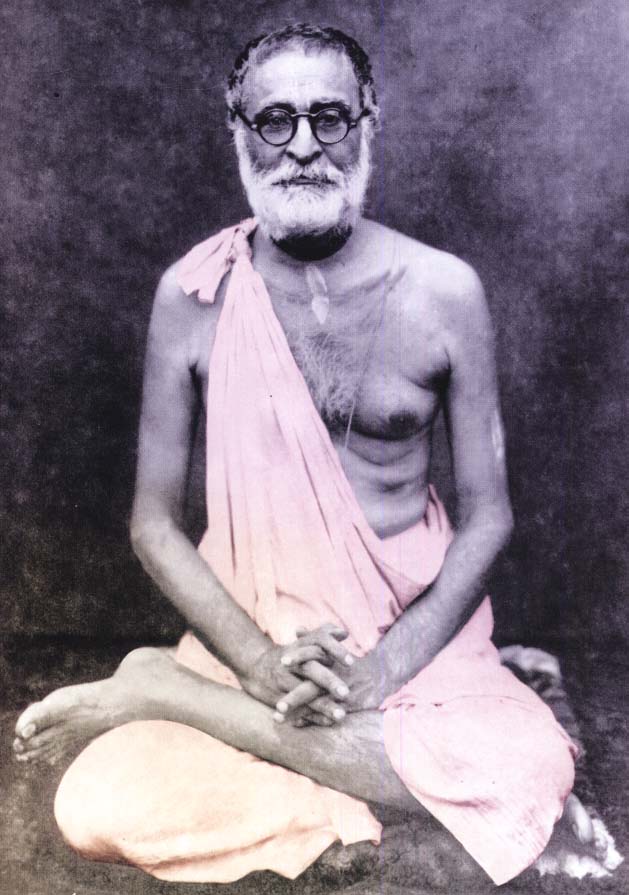
Śrīla Bhaktisiddhānta Sarasvatī Ṭhākura, in the course of his hari-kathā, would often remark: “All the energies of debate will only be pacified by the words of Mahāprabhu Gaurasundara. The discordant world is characterized by illusion, and the world of service is characterized by transcendent divinity. The illusory features that exist in and as the discordant world can never be reconciled by illusory endeavors. Violence and nonviolence—both things will forever be parallel to each other. Those who try to eliminate violence and maintain a policy of nonviolence are bewildered by illusory endeavor. Then again, those who neglect nonviolence and only try to incite a violent world make another sort of illusory endeavor. But those who engage violence and nonviolence in the service of Bhagavān dwell in a world of service that is characteristically transcendent. Even though the kṣātra-nīti, or warrior’s policy, that Arjuna adopted on the advice of Bhagavān in the battle of Kurukṣetra may appear violent to the eyes of the world, it is so superior to nonviolence, or brāhmaṇa-nīti, which is conjured up on the mental platform. Bhagavān is the Absolute Truth. Therefore, He and His words are one entity. Just as Bhagavān is the eternal truth, whole and pure, His words are likewise eternally true, whole, and pure. Hence, what He said of violence to encourage Arjuna in battle is situated at a much higher platform than Arjuna’s own mentally contrived policy of nonviolence. Therefore, following the order of Bhagavān is the only means to find safety from the clutches of the world’s illusory, mundane feature.”
The brahmāstra that Aśvatthāmā cast was a feature of mundane reality, but the brahmāstra that the great warrior Arjuna deployed on the order of Bhagavān in order to counteract Aśvatthāmā’s brahmāstra was based on service and a feature of transcendence. Therefore, if Indians so desire, they can, on Śrī Bhagavān’s order, protect the world from the mundane nuclear devices by casting a more advanced type of brahmāstra. It is imperative we know what that spiritual brahmāstra is. Under the guidance of Śrīla Bhaktisiddhānta Sarasvatī Ṭhākura, we find in the words of Śrīla Gaurasundara just which type of advanced brahmāstra all the living entities of the world, who are afflicted by Kali, can deploy in order to counteract the mundane realm’s brahmāstra, or “atom bomb.”
The brahmāstra of kṛṣṇa-prema, divine love for Kṛṣṇa, that Śrīman Mahāprabhu ordered us to deploy is described as follows:
“ataeva āmi ājñā dila sabākāre
jā̃ha tā̃hā prema-phala deha jāre tāre
Therefore, I have ordered everyone:
Wherever, everywhere—give the fruit of divine love to anyone and everyone.
ekalā mālākāra āmi koto phala khābo
nā diyā vā ei phala āra ki karibo
How much fruit will I, the lone gardener, eat?
If I do not give this fruit away, what else will I do?
ātma-icchāmṛte vṛkṣa siñci nirantara
tāhāte asaṅkhya phala vṛkṣera upara
I water this tree incessantly with the nectar of My soul’s desires.
Therefore, there are countless fruits atop this tree.
ataeva saba phala deha jāre tāre
khāiyā hauk loka ajara amare
Therefore, give all the fruit to anyone and everyone.
Let the people eat of this fruit and become ageless and deathless.
jagat vyāpiyā mora habe puṇya khyāti
sukhī haiyā loka mora gāhibeka kīrti
The fame of My piety will spread across the world.
People will be happy and sing My glories.
bhārata bhumite haila manuṣya-janma jāra
janma sārthaka kari’ karo para-upakāra”
Those who have taken a human birth in the land of India—
Make your births meaningful and help others.
(Caitanya-caritāmṛta, Ādi 9.36–41)

Just as the valiant Arjuna destroyed the brahmāstra of the bogus brāhmaṇa Aśvatthāmā on Śrī Bhagavān’s order and made the inhabitants of the world happy, may those who identify as the followers and servants of Śrī Kṛṣṇa Caitanya Mahāprabhu take a solemn, resolute vow as per Śrī Caitanya Mahāprabhu’s order and perform hari-kīrtana in the line of Śrī Caitanya throughout the whole world, thereby protecting the people of the world from this nuclear brahmāstra. We take straw in our teeth and fall at everyone’s feet, beseeching all the followers of Śrī Caitanya Mahāprabhu, with hundreds upon hundreds of anguished entreaties, to congregate, taking the fruit of kṛṣṇa-prema that Śrī Caitanya Mahāprabhu has given with His own hands, and preach all over the world. We are not saying this only to one individual person. The detestable fate of those who are not distributing Gaurasundara’s fruit of prema and are instead preoccupied with solitary bhajana, imitating the garb of Śrīla Rūpa Gosvāmī, is equal to those who live off the maṭhas and temples established by Śrīla Bhaktisiddhānta Sarasvatī Ṭhākura or who imitate him by constructing maṭhas separately, all the while neglecting the speciality of his preaching, siding thus with the caste gosā̃i types. The chief minister of Uttar Pradesh, Sampūrṇānandajī is very busy implementing his “Bhikṣuka Law”. Therefore, beware beggars! Sādhu sāvadhāna, sādhu sāvadhāna!! Śrī Gaurasundara will not tolerate for much longer the lackluster lives of those who do not distribute His message to the world and who are content like frogs in wells with their own individual flocks of gluttonous types. From now, sādhu sāvadhāna! Again I say, sādhu sāvadhāna!! Everyone, get organized. The living entities afflicted by Kali will make offenses and will keep doing so. That is why Gaurasundara looks to their simplicity and does not refuse them. There is a saying in English: “It is better late than never.” It is better to heed Gaurasundara’s words a little late than not at all. Therefore, our request is this: “Those who identify themselves as the surrendered servants of Śrī Śrī Gaurasundara should all join together. The ācāryas have made and left so many facilities and conveniences for the performance of hari-kīrtana. Do not waste time. Get organized and let the message of Gaurasundara be preached throughout the whole world. Missionary work requires many people and much money. This is not within the capacity of some lone hero. Svayaṁ Bhagavān, the Supreme Lord Himself, Gaurasundara spoke of Himself as ‘ekā – alone’ and weak (?) in order to teach us:
“ekalā mālākāra āmi koto phala khābo
ekalā vā koto phala pāḍiyā bilābo”
Therefore, we beseech all the Pir Sahibs of the world and insist that being a lone “pīr-bāvurci-bhisti-khar – a one-man-show” will get nothing done. The critical crisis will become more critical.
—Śrī Abhaya-caraṇa Bhaktivedānta
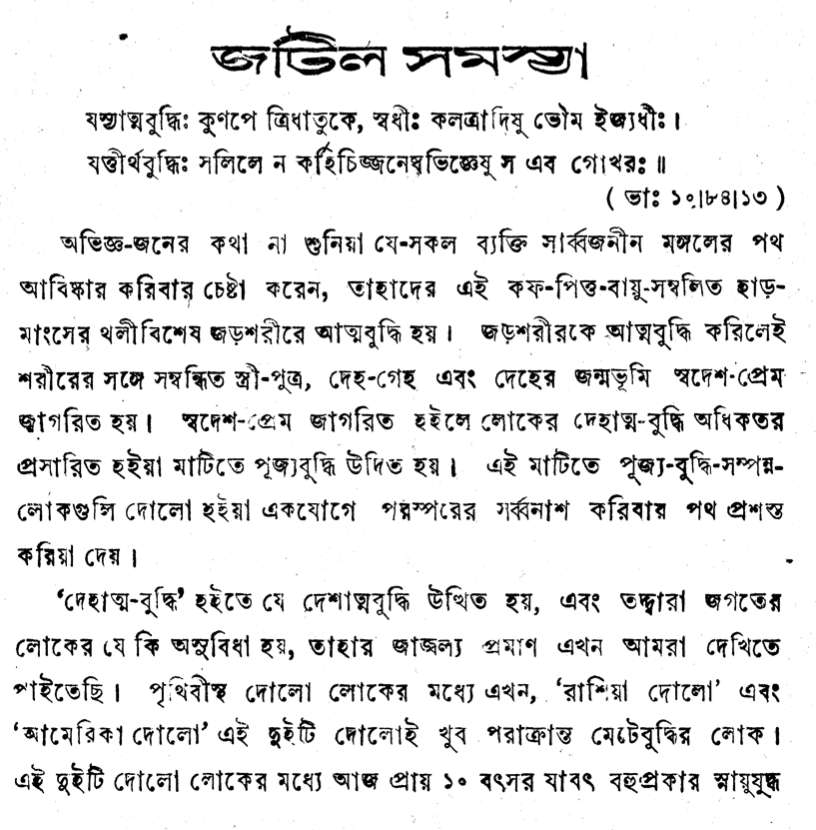
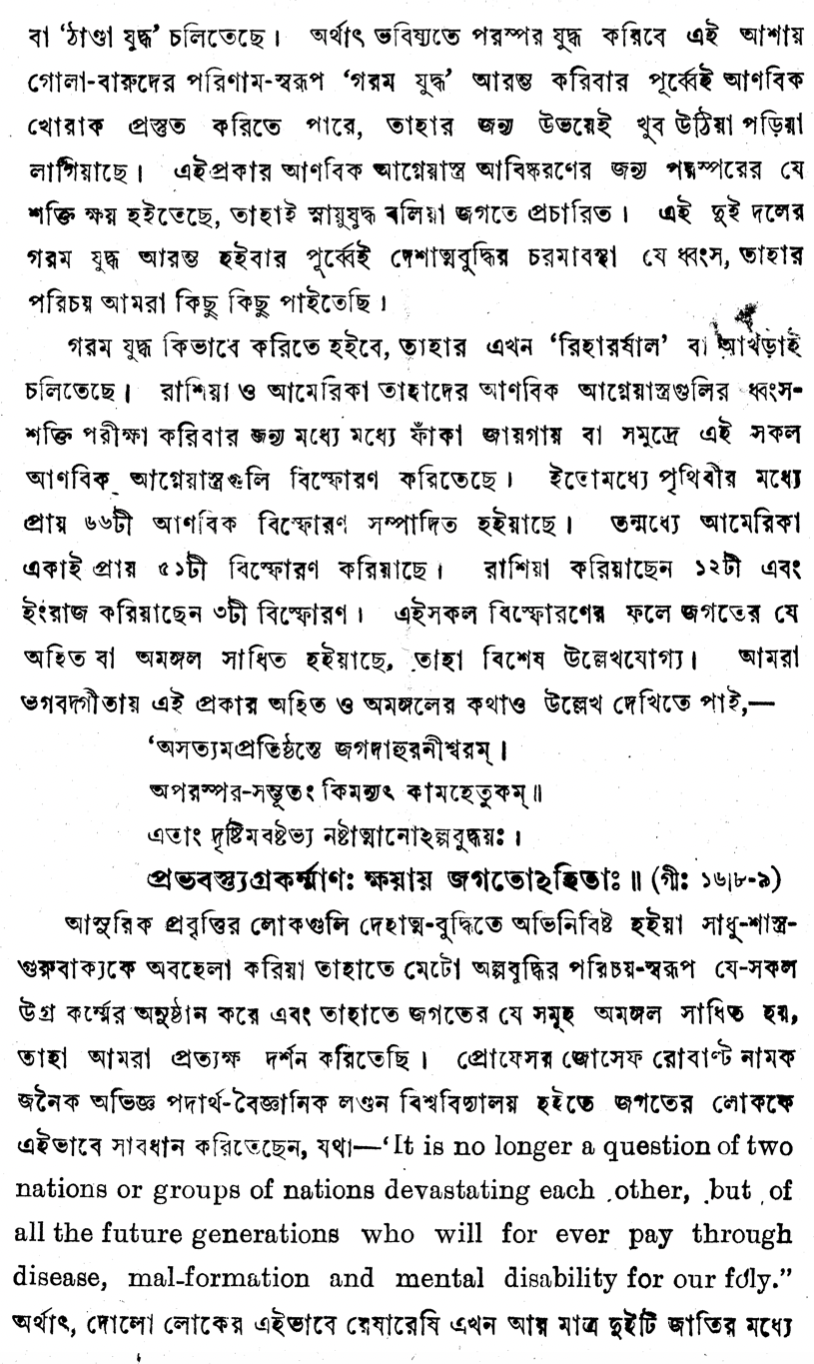

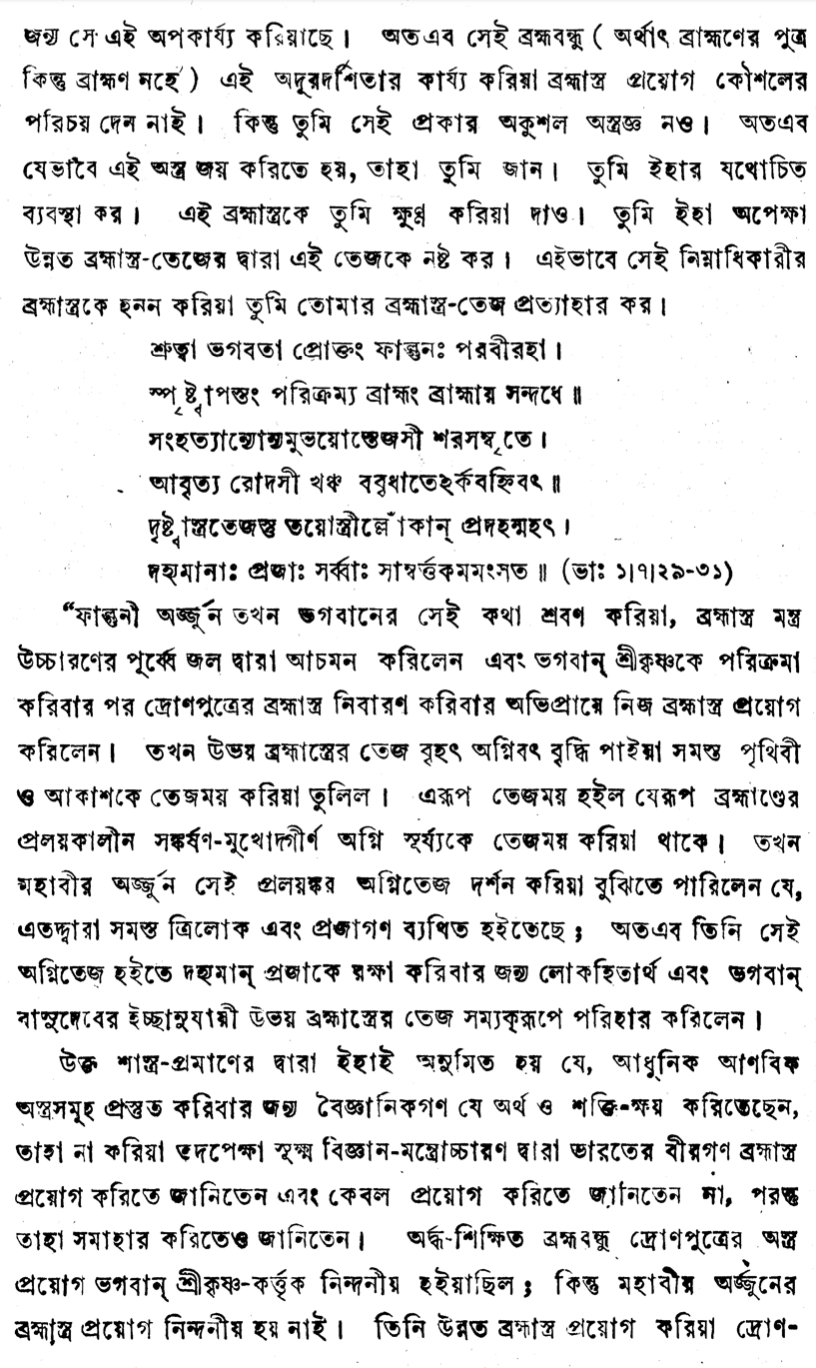






Notes:
Above, Śrīla A.C. Bhaktivedānta Svāmī Prabhupāda beautifully paraphrases the words of Śrīla Rūpa Gosvāmī ("namo mahā-vadānyāya..."), Śrī Prabodhānanda Sarasvatī ("dante nidhāya..."), and his own gurudeva, Prabhupāda Śrīla Sarasvatī Ṭhākura, who refers to the humble, anguished words of Śrī Prabodhānanda Sarasvatī as "the preaching process".
Śrīla A.C. Bhaktivedānta Svāmī Prabhupāda shows us here what it looks like when a person fully takes to heart the words of their spiritual master. The following is an excerpt from an article by Śrīla Bhaktisiddhānta Sarasvatī Ṭhākura on the occasion of his Vyāsa-pūjā, published February 26, 1927. Here, after a lengthy exposition of Śrīmad-Bhāgavatam and Bhāgavata-dharma as taught by Śrī Caitanya Mahāprabhu, he concludes his response to the many eloquent written offerings made by his disciples as follows:
etāṁ samāsthāya parātma-niṣṭhām adhyāsitāṁ pūrvatamair maharṣibhiḥ
ahaṁ tariṣyāmi duranta-pāraṁ tamo mukundāṅghri-niṣevayaiva
[I will cross the unsurpassable ocean of material existence by becoming fully devoted to the lotus feet of Śrī Mukunda, as approved by the great sages of old who were firmly devoted upon Parātma, the Supreme Soul (Śrī Kṛṣṇa).]
Giving regard to any type of sādhana other than that described in this verse will simply be a waste of our time. We shall simply adopt the preaching process presented by tridaṇḍipāda Śrī Prabodhānanda and progress along the path of kīrtana:
dante nidhāya tṛṇakaṁ padayor nipatyakṛtvā ca kāku śatam etad ahaṁ bravīmi
he sādhavaḥ sakalam eva vihāya dūrād-gauraṅga-candra-caraṇe kurutānurāgam
[“With a piece of straw between my teeth, I fall at your feet and beseech you in a hundred ways to let me say just this: 'O saintly person: relinquish all that you have learnt and simply develop loving attachment for the feet of Gaurāṅga-candra!'”]
